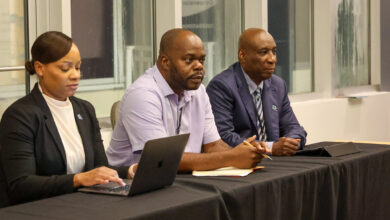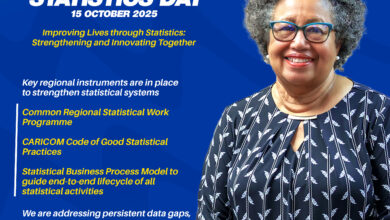I would normally start by saying that it is a pleasure for me to be here today; however, there is nothing pleasurable about the topic that brings us here today. For it must concern us that the number of HIV infected persons in the Caribbean is larger than the entire population of Barbados; we cannot afford to lose sight of the fact that the number of new HIV infections occurring in the Caribbean last year bordered on the entire population of St. Maarten; and above all, we cannot ignore the fact that AIDS claimed an estimated 27,000 lives in 2005 making it the leading cause of death among adults aged 15-44 years.
In all of this, we can find no comfort when, overall in the Caribbean, no more than one in four of the persons in need of antiretroviral therapy were receiving it, and when prevention efforts were palpably lagging across the board.
Mr. Chairman, the UNAIDS 2005 report does provide a glimmer of hope, a hint of progress if you like, in the Caribbean’s response to HIV and AIDS. The report states: “some recent developments in the Caribbean give cause for guarded optimism with some HIV prevalence decline evident among pregnant women, signs of increased condom use among sex workers, and expansion of voluntary counseling and testing”.
Although small and tenuous, these are successes that should be celebrated and credit must be given to all workers in the field. At the same time, we must remain cognizant of the fact that, overall, the statistics remain grim and the picture bleak.
It is in this context that I wish to place on the table what I see as the immediate challenges facing PANCAP and the Caribbean region.
I believe that the first order of business must be to urgently scale up universal access to HIV-related prevention, care, treatment and support services. Such efforts should embrace the principles of equity, accessibility and affordability. In other words, our dragnet (if I may be permitted a crude expression) must capture all persons in need – in every geographical locality, from every social stratum, from every diversity in our midst.
But I am also keenly aware that we will never be able to achieve the lofty goal of universal access to prevention, care treatment and support in the Caribbean unless we tackle the pervasive and debilitating phenomenon of stigma and discrimination in the most concentrated and vigorous fashion.
I am convinced that whatever measures are adopted must speak squarely to our political directorate and key policy makers on the outstanding legal issues to addressed; they must face off with our professionals on the ethical standards and practices that are demanded of them in the new dispensation; they must challenge business and labour on inappropriate employment practices; they must urge faith-based organisations to hold fast to the tenets of their creed; they must interrogate the media on their agenda for social development; and they must shake civil society and communities out of their stance of indifference and hostility to people living with HIV/AIDS.
And so, as you the delegates of this 6th Annual General Meeting of PANCAP deliberate over the next two days in defining its strategic agenda for the future, I urge that you allow your decision-making to be anchored by empirical data rather than by anecdotal information; I advocate pragmatism over sentimentality, and I exhort boldness over pandering to the status quo. It cannot be business as usual. In this call to arms, we must know that, in the words of David Rudder, the venerable Trinidadian calypsonian: “the journey now start”, and the road ahead is long and arduous.
The role played by the CARICOM Secretariat in the conception, birth and early development of the Pan Caribbean Partnership against HIV and AIDS (PANCAP) is a matter of public record; and it is a record that has given us a great deal of satisfaction. I can also say with pride that, during its first five fledging years, one of the driving forces behind PANCAP as it struggled to find its feet and define its character was my colleague, Assistant Secretary-General with responsibility for the Directorate of Human and Social Development, Dr. Edward Greene. We are very appreciative of the visionary role Dr. Greene has played in this endeavour and I crave your indulgence, Mr. Chairman, to salute him for his continued leadership and the committed efforts of his staff in the regional fight against HIV and AIDS.
We also owe a debt of gratitude to our international partners whose consistent support has meant the difference between what success we have achieved and failure and whose continued support will mean life or death.
The arrangements for this meeting have been splendid and I extend our appreciation to the government and people of the British Virgin Islands for preparing an environment in which these consultations can be fruitfully conducted.
On behalf of the Secretary-General and the Staff of the CARICOM Secretariat, I give you the commitment that the CARICOM Secretariat will continue to play its role in advancing the fight against the scourge of HIV and AIDS in the Caribbean.
I hope that the deliberations of this 6th Annual General Meeting of PANCAP will be productive.
I thank you.





